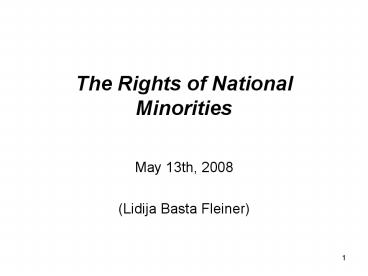The Rights of National Minorities - PowerPoint PPT Presentation
1 / 15
Title:
The Rights of National Minorities
Description:
legitimacy/nation-concept - state-building/constitutive level ... A subsidiarity principle as relevant legal argument? ( Subsidiarity relates to execution! ... – PowerPoint PPT presentation
Number of Views:147
Avg rating:3.0/5.0
Title: The Rights of National Minorities
1
The Rights of National Minorities
- May 13th, 2008
- (Lidija Basta Fleiner)
2
Outline
- International Legal Standards
- At the UN level
- At the regional level (FCNM)
- 3. Another Two Examples EU and China
3
1. The nature of minority problems
- legitimacy/nation-concept -gt state-building/consti
tutive level - state organization and governmental system -gt
constitutional level - identity (culture, language, religion) -gt human
rights aspect - economic resources constitutional issue
- historical and political context post-conflict
and transitory situation - - neighbour states as kin-states
international legal aspects
4
Minority problem is often the problem of
contested states
- the conflict over territory power issue
- it may well be that no democratic solution is
viable within the state - regional and international aspects (kin-state and
international mediation)
5
Definition is not the main problem!
- The Definition of Minorities
- elements
- the key-problem of a definition the legal
nature of minority protection individual and/or
collective rights - Art. 27 ICCPR In those States in which ethnic,
religious or linguistic minorities exist, persons
belonging to such minorities shall not be denied
the right, in community with other members of
their group, to enjoy their own culture, to
profess and practice their own religion, or to
use their own language.
6
2. Basic International Standards of Minority
Protection
- 1. In General Democracy and the Rule of Law
- 2. Minorities in Particular (Individual) Human
Rights Approach
7
2.1.1. Ius cogens principles - UN Declaration
1992
- Declaration on the Rights of Persons Belonging to
National or Ethnic, Religious and Linguistic
Minorities ( resolution of 18 December 1992) - existence protection
- non-exclusion
- non-discrimination
- non -assimilation
8
2.1.2. Positive Measures/Additional Rights
- The right to identity
- Linguistic Rights
- Education Rights
- Media
- The right to establish organisations
- Participation rights
- The right to establish and maintain undisturbed
contacts across the border (kin-state) - protection of minorities without a kin state
(Roma)
9
2.2. The Framework Convention on the Protection
of National Minorities (FCNM)2.2..1. In General
- MR are integral part of fundamental HR and should
be implemented without discrimination - MR are understood as individual and can be
enjoyed in community with other individuals - MR are complementary to the anti-discrimination
principle second level of non- discrimination
legislation (positive measures)
10
- As a legal treaty, the FCNM is a document of
legal principles, aimed at achieving full and
effective (not only equal protection of laws)
equality differential treatment needed - the key aspect and a foundational right
participation rights coming out of the principle
of effective participation in public and economic
life - political dimension in minority rights introduced
by FCNM is a key challenge
11
2.2. 2. Participation Rights
- Art. 15The Parties shall create conditions
necessary for the effective participation of
persons belonging to minorities in cultural,
social and economic life and in public affairs,
in particular those affecting them. - Can decentralisation/participation rights deliver
what federalism promises? (the ambivalence of
Art. 15)
12
Facit
- FCNM helps for small dispersed minorities,
already on the road for assimilation. FCNM is
good for the minorities that are not capable of
exercising regional autonomy or of sustaining a
high degree of institutional completeness.
(Kymlicka)
13
The Limits of EU Engagement in Minority
Protection
- EU definition of minority applicable on EU
territory?! (States decide on ratio personae!) - Constitutional arguments/concerns against a full
fledged EU system of minority protection - The lack of EU competence (political consensus)
in minority protection - A subsidiarity principle as relevant legal
argument? (Subsidiarity relates to execution!) - A proper EU supranational system would unify
solutions and bring more legal security and
equality. - Argument against a constitutional nature of EU
- a/ EU is not a state, and minority protection
should remain within states constitutional
competence - b/) EU has no unified nationality and citizenship
law
14
EU nonetheless offers to minorities
- regionalism on the European scene
- EU law principles of direct effect and the
supremacy of the Union law - Financials resources to a vast variety of policy
fields cultural policy, social policy, regional
policy, language - Anti discrimination (Art. 21 of the Charter!)
legislation in EU countries - the rights of immigrant minorities by providing
an additional set of rights to nationals of
member states, the Union augmented the
differences between EU from non-EU citizens
(Italy on Roma)
15
Also under UN regime, but a different Case China
- Tradition and communism two major underpinnings
of minority policy - Comprehensive constitutional and legal basis for
minority protection - MR are context-related rule by law and no civil
society - No place for political dimension in MAR
- Autonomy is the most striking aspect of minority
rights but its aim is to appease instead of
accommodating minorities





![Ombudsman [0mb] Protecting the rights of minorities PowerPoint PPT Presentation](https://s3.amazonaws.com/images.powershow.com/7523959.th0.jpg?_=20200331113)
![[PDF⚡READ❤ONLINE] Neither Settler nor Native: The Making and Unmaking of Permanent Minorities PowerPoint PPT Presentation](https://s3.amazonaws.com/images.powershow.com/10046672.th0.jpg?_=20240603055)
























